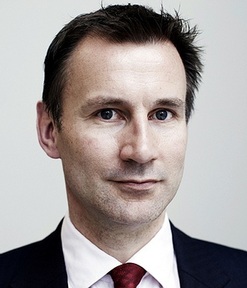Health Secretary outlines action plan in Government’s official response to the Francis Inquiry
Jeremy Hunt labelled the Mid Staffordshire NHS Trust scandal a “betrayal of the worst kind” during his speech to the House of Commons today.

The Health Secretary made the bold statement as he outlined the Government’s official response to the Francis Inquiry, which was conducted by Robert Francis QC who investigated appalling neglect at Stafford Hospital between 2005 and 2009.
Mr Hunt started his speech by paying tribute to Mr Francis and thanking him for producing a “seminal report” which he believes will “mark a turning point” in the history of the NHS.
In his report, which was published in February, Mr Francis concluded the Trust became preoccupied with cost cuts, targets and processes and lost sight of its fundamental responsibility to provide safe care.
Speaking about the scandal, which saw some patients going unwashed for up to a month and others lying in soiled sheets, this morning, the Health Secretary said: “Many terrible things happened at Mid Staffs, in what has rightly been described as the NHS’s darkest hour.
“Both the current and former Prime Minister have apologised but when people have suffered on this scale, and died unnecessarily, our greatest responsibility lies not in our words but in our actions.
“Actions that must ensure the NHS is what every health professional and patient wants – a service that is true to the NHS values, that puts patients first, and treats people with dignity, respect and compassion.”
Mr Hunt set out the Governments response to the inquiry and outlined its objectives in a five-step plan – to put the needs of patients first in an attempt to stop problems arising, detecting any problems early, taking prompt action, ensuring robust accountability and encouraging strong motivation and leadership.
Taking each of them in turn, he said it is vital a “culture of zero harm and compassionate care” is implemented throughout the NHS in a bid to prevent problems. Mr Hunt added it was also important the needs of patients are “central, whatever the pressures of a busy, modern health service”.
He promised the Government would introduce a new regulatory model under a “strong, independent” Chief Inspector of Hospitals who work for the Care Quality Commission (CQC) and will assess the performance of hospitals. Mr Hunt also told the House of Commons that a Chief Inspector of Social Care will be appointed.
Moving onto the issues of detecting problems early, Mr Hunt recognised an issue highlighted by Mr Francis in his report, a “disjointed system of regulation and inspection smothered the NHS, collecting too much information but producing too little intelligence”. In a bid to rectify the situation the Government will introduce a “new statutory duty of candour for providers, to ensure that honesty and transparency are the norm in every organisation”. Mr Hunt added that the new Chief Inspector of Hospitals will act as the nation’s “whistleblower in chief”.
The Health Secretary noted that the Francis Inquiry found a number of signs warning of the problems within Mid Staffordshire NHS Trust but “ministers and managers in the wider system failed to act” on them. As a result, he said no hospital will achieve a rating of good or outstanding if fundamental standards are breached.
Referring to the Government’s response to the issue of accountability, Mr Hunt said the scandal was “not typical of our NHS” and that the “vast majority of doctors and nurses give excellent care day-in day-out”. To tackle accountability he said the Government will implement various strategies, including asking some regulatory boards to “tighten their procedures for breaches”.
Finally the Health Secretary dealt with leadership and motivation. During this section of his speech, Mr Hunt announced changes to the way nurses will be trained. In future NHS-funded students will be required to work as support workers or healthcare assistants before funding is provided for their course.
This decision has been backed by Professor Dean Rivers, Director of the Centre for Health Enterprise at Cass Business School, who said: “The need for care and compassion within the health system is essential. This suggestion provides a pragmatic solution, enabling individuals entering the care system to self-assess whether they truly hold the values of the NHS and subscribe to the vocation they are entering.”
However Dr Peter Carter, chief executive and general secretary of the Royal College of Nursing, has concerns about the requirement for student nurses to work as health assistants before funding is provided for their course. He said: “We have a number of urgent questions about the suggestion that all student nurses should first spend a year working as health care support workers.
“Who will train, employ and monitor tens of thousands of these support workers? How can the Government deliver this radical change to nurse training on a cost-neutral basis? And how will we ensure that the supply of nurses does not become restricted?
“We are committed to working closely with Government and key partners on clarifying these concerns and ensuring that the pilots are fully evaluated and the results are acted upon. However, let’s be clear, last year’s independent Willis Commission found no evidence that nursing education is failing, nor that it is associated with a decline in compassion.”
Dr Carter also spoke about the Government’s decision to look at staffing levels and welcomed the idea but he still had some reservations. He said: “The reality is that nurses continue to work with up to 11 patients each in older people’s settings and with even higher numbers in care homes.
“Simply leaving the setting of staffing levels to local discretion clearly isn’t working and the time has come for mandatory, legally enforceable safe staffing levels. It’s what patients need, deserve and increasingly will start to demand.”
Concluding his speech to the House of Commons, Mr Hunt said: “The events at Stafford Hospital were a betrayal of the worst kind. A betrayal of the patients, of the families, and of the vast majority of NHS staff who do everything in their power to give their patients the high-quality, compassionate care they deserve.
“But I want Mid Staffs not to be a byword for failure, but a catalyst for change. To create an NHS where everyone can be confident of safe, high quality compassionate care where best practice becomes common practice and where the way a person is made to feel as a human being is every bit as important as the treatment they receive.”
The chief executive of the CQC this afternoon welcomed the Government’s response to the Francis Inquiry and spoke about the body’s future role. David Behan said: “Robert Francis’ report is defining for everyone involved in healthcare. We will bring forward important changes including the appointment of a Chief Inspector of Hospitals.

“We are also clear that we will inspect acute hospitals and mental health trusts better by changing what we look at when we inspect so that we focus on the four key areas that are most important to people – safety, caring, effectiveness and how well they are led.
“We will introduce expert inspection teams that include specialist inspectors, clinical and other experts and people with experience of care. We will also introduce national teams with specialist expertise to carry out in depth reviews of hospitals with significant or long standing problems.”
Following the Health Secretary’s speech earlier today, Rehana Azam, GMB National Officer for the NHS, said the staff union “will do everything we fully can to implement the recommendations”, while Chris Ham, chief executive of The King’s Fund, said the charity “broadly” welcomes the Government’s reponse.
Latest News
 29-Jul-24
Dementia Bus gives carehome.co.uk staff insight into life with dementia
29-Jul-24
Dementia Bus gives carehome.co.uk staff insight into life with dementia
 01-Mar-24
Find out the top care homes in 2024
01-Mar-24
Find out the top care homes in 2024
 21-Mar-23
UK's top care homes in 2023 revealed
21-Mar-23
UK's top care homes in 2023 revealed
 03-Jan-23
carehome.co.uk launches free care helpline
03-Jan-23
carehome.co.uk launches free care helpline
 13-Dec-22
5 mins with Emily Whitehurst, chief operating officer for Constantia Healthcare
13-Dec-22
5 mins with Emily Whitehurst, chief operating officer for Constantia Healthcare